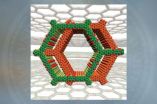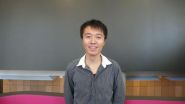(Press-News.org) Yushan Yan, Distinguished Professor of Engineering at the University of Delaware, is known worldwide for using nanomaterials to solve problems in energy engineering, environmental sustainability and electronics.
His early academic work focused on zeolites, porous rock with a well-defined, crystalline structure. At the atomic scale, their pore size is so precisely decided that zeolites can separate molecules with size differences of merely a fraction of an angstrom (one-tenth of a nanometer), making them useful to the chemical and petroleum industries as molecular sieves for separation and catalysis processes.
In a landmark paper -- "Designed Synthesis of Large-Pore Crystalline Polyimide Covalent Organic Frameworks" -- published in the July 23 edition of the international scientific journal Nature Communications, Yan describes a new approach to creating organic zeolites.
"There is a dream out there to build organic zeolites. If you can create organic zeolites, you can do more and even better catalysis and better separations. It opens the door for applications previously thought impossible," he says.
Traditionally, zeolites have been derived from inorganic material like silicon or aluminum. For the past several years, Yan has focused on combining zeolites with organic polymers whose main component is carbon, oxygen, hydrogen or nitrogen.
The challenge in creating organic zeolites, also known as crystalline porous polymers, is that organic polymers like to be amorphous; they do not normally exhibit a pristine crystalline structure.
Yan explains that converting these polymers into a crystalline material is difficult because it requires reactions that are reversible. But polymers typically are created when identical molecules (or monomers) react and form an irreversible bond.
"Think of building a house. If the moment a builder touches one metal beam to another they become stuck together, it would make construction very difficult. In the same way, molecules don't always bond perfectly the first time, and they may need to detach, adjust and reattach to achieve a desired structure. If the reaction is irreversible, molecules can get stuck in a non-ideal position," he says.
Using a mixed solvent with low solubility, Yan's research team devised a way to slow the polymer's intrinsic reactivity down, allowing it to be reversible. At the same time, lowering the temperature reduced the molecules' reactivity and lengthened the reaction time, allowing the molecules to adjust their alignment before becoming connected.
The result is a crystalline porous material with large pores, a large surface area (2,346 square meters — the equivalent of nearly half an American football field — per gram) and excellent thermal stability (530 degrees C).
According to Yan, the technique and the new materials it produces can be immediately useful in catalysis and separations for chemicals production and hydrocarbon conversion for energy applications. He also sees potential for organic zeolites to influence energy research, particularly in membrane development, and fuels cells and battery applications.
"Using organic zeolites in a membrane configuration for separation would naturally reduce the energy cost for separation. I want to leverage this discovery and put forward a new concept in the development of membranes," Yan says.
INFORMATION:
Collaborators on the paper — Yan's second in this emerging area — include Qianrong Fang, Shuang Gu, Robert Kaspar, Junhua Wang, Jie Zheng and Zhongbin Zhuang from UD and Shilun Qiu from Jilin University in China.
About the Professor
Yushan Yan joined the College of Engineering as Distinguished Professor of Engineering, in 2011. At UD, he is affiliated with the Department of Chemical and Biomolecular Engineering, the Center for Catalytic Science and Technology and the UD Energy Institute (UDEI).
Prior to joining UD, Yan served as Presidential Chair of the Department of Chemical Engineering at the University of California, Riverside, where his research group was the first to demonstrate the use of zeolite thin films for semiconductors and aerospace applications and new materials for fuel cells, energy storage and solar hydrogen generation.
An AAAS Fellow, Yan's current research focuses on development of electrochemical energy conversion devices including fuel cells, electrolyzers, solar hydrogen generation and flow batteries. In particular his group has made significant progresses in developing new fuel cell catalysts and membranes to reduce the cost and improve the durability of fuel cells.
University of Delaware researcher describes new approach for creating organic zeolites
2014-07-24
ELSE PRESS RELEASES FROM THIS DATE:
Background TV can be bad for kids
2014-07-24
Parents, turn off the television when your children are with you. And when you do let them watch, make sure the programs stimulate their interest in learning.
That's the advice arising from University of Iowa researchers who examined the impact of television and parenting on children's social and emotional development. The researchers found that background television—when the TV is on in a room where a child is doing something other than watching—can divert a child's attention from play and learning. It also found that non-educational programs can negatively affect children's ...
Wireless home automation systems reveal more than you would think about user behavior
2014-07-24
This news release is available in German.
Home automation systems that control domestic lighting, heating, window blinds or door locks offer opportunities for third parties to intrude on the privacy of the inhabitants and gain considerable insight into their behavioral patterns. This is the conclusion reached by IT security expert Christoph Sorge and his research team at Saarland University. Even data transmitted from encrypted systems can provide information useful to potential burglars. Professor Sorge, who holds the juris Professorship in Legal Informatics ...
Natural products from plants protect skin during cancer radiotherapy
2014-07-24
Radiotherapy for cancer involves exposing the patient or their tumor more directly to ionizing radiation, such as gamma rays or X-rays. The radiation damages the cancer cells irreparably. Unfortunately, such radiation is also harmful to healthy tissue, particularly the skin over the site of the tumor, which is then at risk of hair loss, dermatological problems and even skin cancer. As such finding ways to protect the overlying skin are keenly sought.
Writing in the International Journal of Low Radiation, Faruck Lukmanul Hakkim of the University of Nizwa, Oman and Nagasaki ...
Identified a key molecule in flies that adjusts energy use under starvation conditions
2014-07-24
Most scientific literature devoted to the protein p53 refers to cancer biology, and the functions of this molecule as a tumour suppressor have been described in detail. Furthermore, also in cancer biology, it is known that p53 inhibits the metabolic pathways of tumour cells in order to block their metabolism and prevent their rapid growth and proliferation.
The most innovative research on p53 attempts to unveil its functions in the management of energy stores and nutrients in healthy cells. Recent studies with cell cultures have demonstrated that p53 is activated in response ...
Metastatic brain tumor treatment could be on the horizon with use of SapC-DOPS
2014-07-24
CINCINNATI -- Over half of patients being seen in the clinic for a diagnosed brain tumor have metastatic cancer, which has no treatment and detrimental outcomes in most cases.
However, a Cincinnati Cancer Center (CCC) study, published in the advance online edition of the journal Oncotarget, provides hope that previously studied SapC-DOPS could be used for treatment of brain cancer that has spread.
Xiaoyang Qi, PhD, member of the CCC, associate director and associate professor in the division of hematology oncology at the University of Cincinnati (UC) College of Medicine ...
Seeing the same GP at every visit will reduce emergency department attendance
2014-07-24
Attendances at emergency departments can be reduced by enabling patients to see the same GP every time they visit their doctor's surgery. This is just one of several recommendations made in a report published today, led by researchers at the University of Bristol.
Called 'Primary care factors and unscheduled secondary care: a series of systematic reviews', the report has been compiled by researchers from the University's Centre for Academic Primary Care who looked at evidence from studies around the world. They found that patients who saw the same GP every time they attended ...
New research: When it hurts to think we were made for each other
2014-07-24
Toronto - Aristotle said, "Love is composed of a single soul inhabiting two bodies." Poetic as it is, thinking that you and your partner were made in heaven for each other can hurt your relationship, says a new study.
Psychologists observe that people talk and think about love in apparently limitless ways but underlying such diversity are some common themes that frame how we think about relationships. For example, one popular frame considers love as perfect unity ("made for each other," "she's my other half"); in another frame, love is a journey ("look how far we've ...
Four billion-year-old chemistry in cells today
2014-07-24
Parts of the primordial soup in which life arose have been maintained in our cells today according to scientists at the University of East Anglia.
Research published today in the Journal of Biological Chemistry reveals how cells in plants, yeast and very likely also in animals still perform ancient reactions thought to have been responsible for the origin of life – some four billion years ago.
The primordial soup theory suggests that life began in a pond or ocean as a result of the combination of metals, gases from the atmosphere and some form of energy, such as a lightning ...
Western Indian Ocean communities play vital role in conservation
2014-07-24
An international team of researchers led by the University of York has carried out the first assessment of community-led marine conservation in the Western Indian Ocean.
The results, reported in the journal PLOS ONE, point to a revolution in the management of marine protected areas, with almost half of the sites – more than 11,000 km² – in the region now under local community stewardship.
Marine protected areas (MPAs) are zones of the seas and coasts designed to protect wildlife from damage and disturbance and managed typically by governments rather than by local communities. ...
Melatonin reduces traumatic brain injury-induced oxidative stress
2014-07-24
Traumatic brain injury can cause post-traumatic neurodegenerations with an increase in reactive oxygen species and reactive oxygen species-mediated lipid peroxidation. Melatonin, a non-enzymatic antioxidant and neuroprotective agent, has been shown to counteract oxidative stress-induced pathophysiologic conditions like cerebral ischemia/reperfusion injury, neuronal excitotoxicity and chronic inflammation. Therefore, the research team at the Neuroscience Research Center, University of Suleyman Demire, led by Prof. Mustafa Nazıroğlu, aimed to evaluate whether there ...




